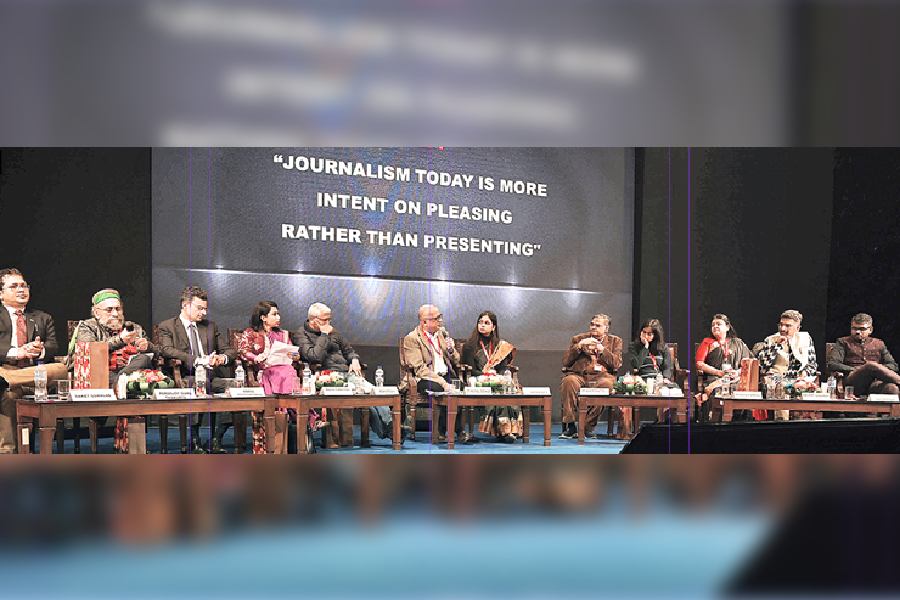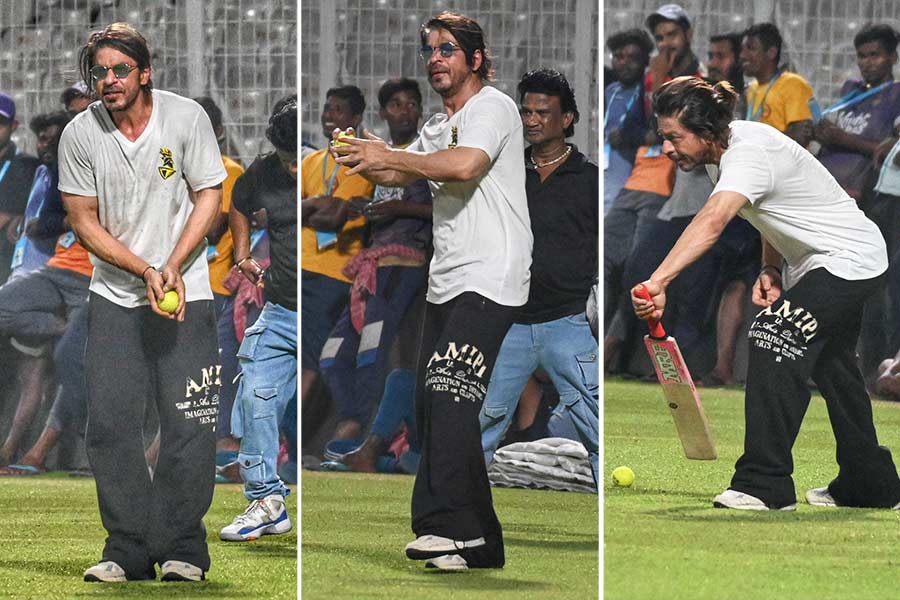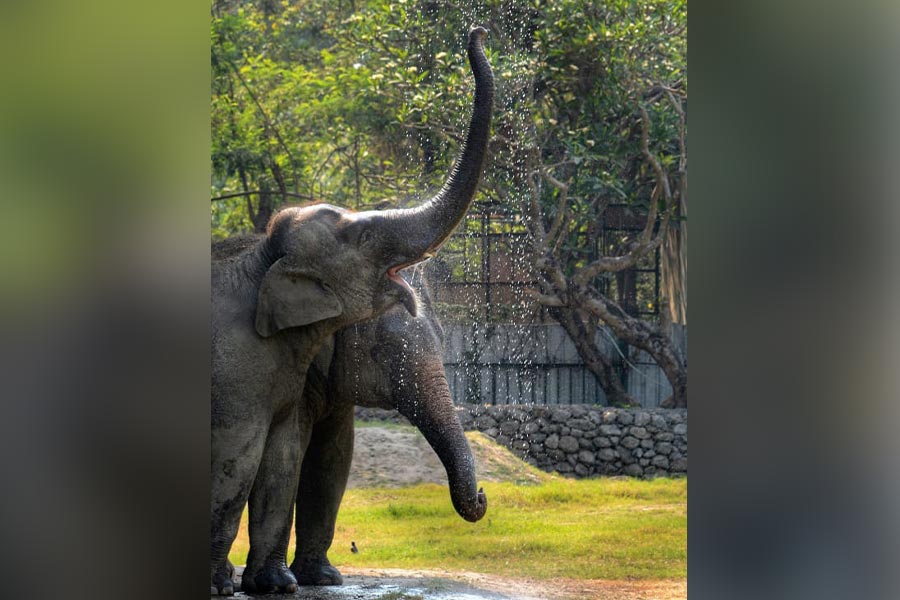The press is busy pleasing powers that be rather than holding truth to power, a Kolkata audience decided on Saturday evening.
Not before it witnessed a fierce fight between two sets of speakers, journalists included. Saturday was the coldest day of the season but at the lawns of Calcutta Club, the atmosphere was heated as arguments were matched, the chair said, “vowel by vowel and consonant by consonant”.
The Debate 2024 presented by the Calcutta Debating Circle in association with The Telegraph had the motion — “journalism today is more intent on pleasing rather than presenting”.
The contest was much closer than it seemed at the beginning. Before any of the debaters spoke, Kunal Sarkar, cardiac surgeon and chairperson of the debate, asked for a show of hands to have a sense of what people thought of the motion.
The audience, which numbered over 1,000, voted overwhelmingly in favour of the motion. But at the time of the final show of hands after the debate, the motion was carried by a slender margin.
Journalist-author Paranjoy Guha Thakurta, the first speaker, pulled no punches.
“As a journalist who has been working for the last 46 years, I am ashamed, disappointed, deeply so, when I look at my brothers and sisters who have forgotten what they were supposed to do. The job of journalism in a democracy is to hold truth to power, to ask questions to those who are ruling us.
“A large section of Indian media is determined to act as if they work for a public relations company or advertising agencies. Why has this particular phenomenon been so widespread across large sections of the media, especially in the last 10 years, coinciding with Narendra Modi becoming the Prime Minister in May 2014,” he asked.
Guha Thakurta attributed the loss of press freedom to the media’s dependence on government ads.
Much of the debate was a clash of political positions, with some speakers lamenting the loss of press freedom under the Modi regime and some asserting that a pliant media preceded Modi’s ascendance to power.
JNU professor and public speaker Anand Ranganathan, who said he felt “abducted” to be on the same side with Guha Thakurta, quoted B.R. Ambedkar’s views on Indian journalism.
“Indian journalism is written by drum boys to glorify their heroes. Never has the interest of the country been sacrificed so senselessly for the propagation of hero worship,” he quoted Ambedkar as saying.
“Nothing has changed in 100 years. You believe what you see but unfortunately what you see is written by those
who see what they believe. Forget the risk of losing government ad revenue. Journalists have realised that if they have to escape prison, they must please their political masters, be it in Delhi or in Bengal,” he said.
He read out a litany of charges — against the BJP and the Congress — of U-turns and ideological compromises and said no journalist dared to ask Modi, Rahul Gandhi about them. He also read out a series of allegations against the Trinamul government in Bengal and accused the local media of assigning them to the footnotes.
Advocate and author J. Sai Deepak, in the opposition, said the DNA of the media was shaped during the Emergency.
“I think it is very convenient and mighty rich to reduce the scope of analysis only to a period from 2014 to 2023. Because then, it seems almost like there was a golden period of journalism which we witnessed in the past and suddenly things have gone to the dogs.
“The DNA of the media as it stands today is significantly forged and shaped by the crucible of the Emergency. It is significantly forged by the Nehruvian legacy and Gandhian legacy, not Mahatma Gandhi but Indira Gandhi,” he said.
The youngest member of the opposition, New York University PhD scholar Moyuree Mukherjee, said the intent of journalists was not to please but to polarise.
“The intent of journalism today is to polarise. The more salacious, the more sensational, the more volatile, the more vicious, the more hateful, the more revenue and the more lucrative it is,” she said.
Neurosurgeon Sandip Chatterjee said the primary job of journalists is to present.
“Suppressed, oppressed or depressed, whatever the press may be, but their job is to present. And it is through the medium of presentation, that they may seek to please or displease. Pleasure or displeasure is the secondary result,” he said.
Whether one is pleased or displeased depends on one’s political colours, Chatterjee contended.
Speaking for the motion, Trinamul Rajya Sabha MP and RTI activist Saket Gokhale said the media owners had capitulated to the regimes in power
“We often take pot shots at journalists. But they are doing what they have been told from above. Look at the editors. They don’t have editorial independence,” he said.
Shama Mohamed, Congress spokesperson and a dentist, and Priyanka Tibrewal, advocate and a prominent face in the Bengal BJP, speaking for and against the motion, respectively, spoke like they do in debates on news channels.
“Before 2014, the media could freely criticise the UPA government or its Prime Minister, Manmohan Singh,” Mohamed said, before citing the alleged hounding of Siddique Kappan and the Delhi-based portal, NewsClick, to highlight the “atrocities” on journalists under the current dispensation.
Tibrewal was aghast at the proposition blaming Modi for everything under the sun.
She linked press freedom to TV debates, newspaper articles and social media content on the anti-CAA protests, farmers’ protests and the Hindenburg report.
“If all journalists wanted was to please Modi, why were these things being shown in the media,” she asked.
Journalist and former AAP member Ashutosh, who spoke for the motion, said: “You could question Manmohan Singh without having an agenda. You could question Atal Behari Vajpayee without having an agenda. But today, if you ask questions, you will be hounded and charged with having an agenda”.
Sanket Upadhyay, journalist and in the opposition, said no individual was neutral.
“There is one condition when an individual is truly neutral. When he is dead. There is nothing wrong in being opinionated. Let those opinions be based on absolute facts. The problem is that the opinion has become absolute. The fact is being retro-fitted,” he said.






